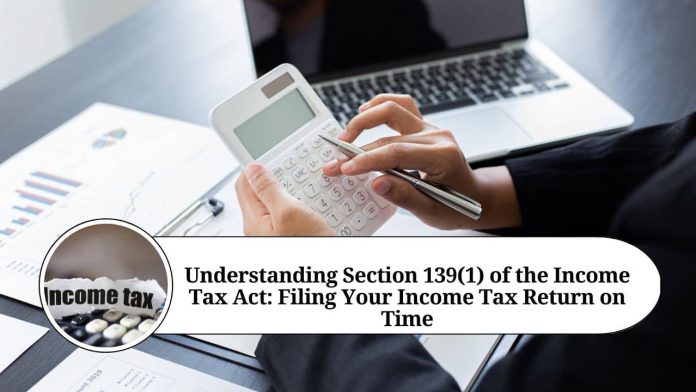Paying taxes is one of the most important civic duties of every citizen. The government collects taxes from its citizens to provide various services like healthcare, education, infrastructure, etc. The Income Tax Act, of 1961 governs the taxation system in India. One of the key provisions of the Income Tax Act is Section 139(1), which requires every individual and entity to file their income tax return on time. In this article, we will discuss the various aspects of Section 139(1) and its implications for taxpayers.
What is Section 139(1)?
Section 139(1) of the Income Tax Act, of 1961 mandates that every person whose total income during the previous year exceeds the basic exemption limit should file an income tax return. The basic exemption limit is the minimum amount of income below which no tax is payable. The current basic exemption limit for individuals is Rs. 2.5 lakhs per annum.
Who needs to file an income tax return?
As per Section 139(1), the following individuals/entities need to file an income tax return:
- Individuals/HUFs whose total income exceeds the basic exemption limit.
- Companies, firms, LLPs, trusts, associations, and other legal entities.
- Any person who has incurred a loss in the previous year and wishes to carry forward a such loss for future set-off against profits.
What is the due date for filing an income tax return?
The due date for filing an income tax return is usually 31st July of the assessment year (AY) for individuals and entities who are not required to get their accounts audited. For example, for income earned during the financial year 2021-22, the due date for filing an income tax return would be 31st July 2022.
However, if the taxpayer is required to get their accounts audited as per Section 44AB of the Income Tax Act, the due date for filing an income tax return is 30th September of the assessment year. For example, for a company whose accounts are required to be audited, the due date for filing income tax returns for the financial year 2021-22 would be 30th September 2022.
What are the consequences of not filing an income tax return on time?
If a taxpayer fails to file an income tax return on or before the due date, he/she may have to pay a penalty under Section 234F of the Income Tax Act. The penalty amount depends on the delay in filing the return and the total income of the taxpayer. For example, if the return is filed after the due date but on or before 31st December of the AY, the penalty amount would be Rs. 5,000. If the return is filed after 31st December but before the end of the AY, the penalty amount would be Rs. 10,000.
Apart from the penalty, there are other consequences of not filing an income tax return on time. The taxpayer may not be able to carry forward losses incurred in the previous year to future years. Also, the taxpayer may not be able to claim certain deductions, exemptions, or credits if the return is filed after the due date.
Final Conclusion:
Filing income tax returns on time is not only a legal requirement but also a responsible civic duty. Section 139(1) of the Income Tax Act makes it mandatory for every taxpayer whose total income exceeds the basic exemption limit to file an income tax return on time. Failure to comply with this provision may result in penalties and other consequences. Therefore, taxpayers should ensure that they file their income tax return on or before the due date to avoid any adverse consequences.
Frequently Asked Questions:
Q: Who is required to file an income tax return under Section 139(1)?
A: Any individual, Hindu Undivided Family (HUF), company, firm, or other entity whose total income during the financial year exceeds the basic exemption limit is required to file an income tax return.
Q: What is the due date for filing an income tax return under Section 139(1)?
A: The due date for filing an income tax return for most taxpayers is July 31st of the assessment year. However, for taxpayers who are required to have their accounts audited, the due date is September 30th of the assessment year.
Q: Can I file my income tax return after the due date?
A: Yes, you can file your income tax return after the due date, but you may be subject to late filing fees and interest on any tax due.
Q: What documents do I need to file my income tax return under Section 139(1)?
A: You will need your PAN card, bank statements, salary slips, Form 16 (if applicable), TDS certificates, and any other relevant financial documents.
Q: Is it mandatory to file an income tax return even if my income is below the basic exemption limit?
A: No, if your income is below the basic exemption limit, you are not required to file an income tax return. However, if you have any taxes withheld at the source or if you want to claim a refund of any taxes paid, you may need to file a return.
Q: Can I file my income tax return online?
A: Yes, you can file your income tax return online using the income tax department’s e-filing portal or other authorized websites.




















